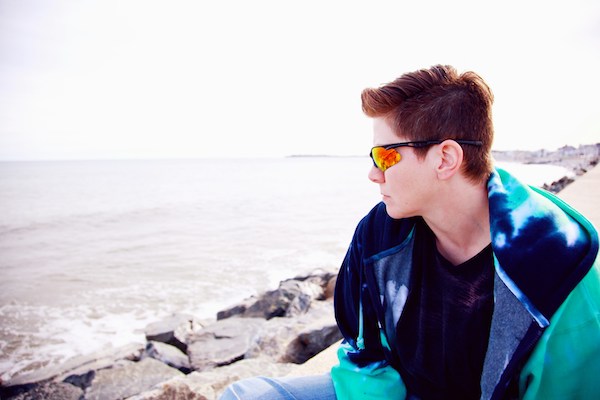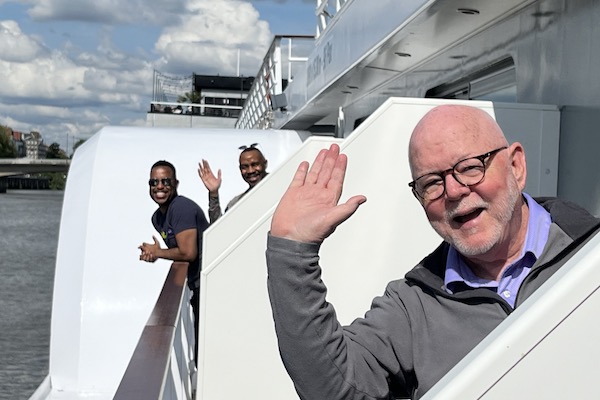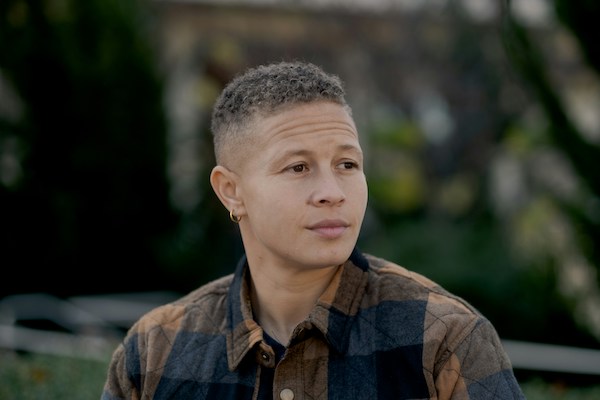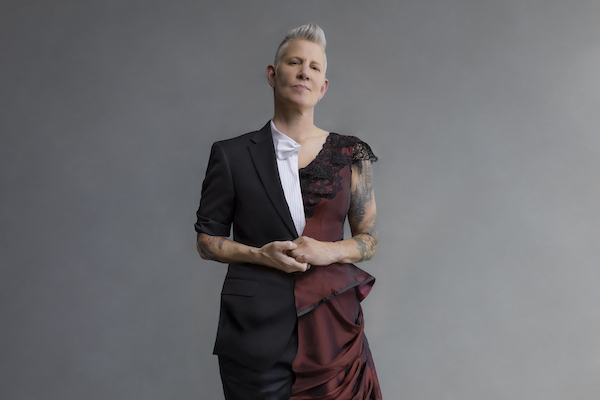
Comic Anthology “The Out Side” Explores Gender Euphoria
January 16, 2024
Comcast NBCUniversal partners with News is Out and Word In Black to launch fellowship program that highlights Black and LGBTQ+ issues
February 6, 2024Most travelers understand that globetrotting isn’t always fun and games. They know and accept that their fun adventures will also likely be paired with tension, confusion, and frustration. These are the downsides of traveling. Like standing in long, zigzagging airport lines, continually looking at your watch, knowing for sure you’re going to miss your flight. Or getting stuck in the middle seat on a nine-hour flight, or waiting for luggage that will never arrive, or suffering through the fog of jet lag. Anyone who travels can relate to these “issues,” no matter who you are or what you look like.
As of now, there are 64 countries where it is illegal and punishable to be LGBTQ+. As a butch lesbian, most of the problems I’ve faced traveling have not been from physical violence, although admittedly, I’ve deliberately avoided countries where being gay is illegal. I have, however, traveled to many that are not particularly welcoming or accepting of LGBTQ+ individuals. These are the places in which I’m misgendered constantly, stared at routinely, and often met with confused faces upon seeing my size and appearance. This is a dead giveaway that I’ve landed in a country where the stereotypical male/female gender archetypes are customary and followed.
A few years back, I was in a major airport in India, slowly working my way through security. There were two distinct lines that everyone had to pass through for security: one female and one male. I queued up in the female line because I knew my gender. Within a minute, an airport official informed me I was in the wrong line. Blushing as if I’d done something wrong, I said, “No, I’m a woman.” He smiled and apologetically moved on.
Another ten minutes passed (it was a long line), and a different airline official motioned for me to move to the male security line. Trying to appear cool and unfazed, I said, “I am a woman.” By the time I reached the front of the line, I was profusely sweating—not the best look going through airport security. The female line’s security official automatically and nonchalantly waved me forward, not looking up. However, upon actually seeing me, she immediately put up her hand and—that’s right—pointed me to the other line. I calmly and quietly said, “I am a woman.”
I didn’t dare to make a scene. Why would I? Three times I was informed I was in the wrong line, but each person was polite and immediately apologized. I can’t blame individuals for a country’s misunderstanding of gender expression or level of LGBTQ+ awareness and acceptance, but it takes a toll. An outsider might not understand how these incidents, while uncomfortable and possibly inconvenient, could be that damaging. And I might agree if it happened once. Maybe even twice. But it wasn’t just one or two times. It’s something I deal with daily, especially when traveling. It can be overwhelming to have to declare and prove my gender to strangers constantly.
It’s not just traveling to foreign countries where LGBTQ+ people have to deal with prejudice. In the United States, being LGBTQ+ is not a crime (yet). Despite this, many of the negative encounters I’ve had while traveling have been here in the USA. Most have been in airports. Yes, airports. Let that sink in for a minute. An airport is a hub, a major crossroads of sorts, both nationally and internationally, where presumably all manner of people pass each other. I don’t think there’s any particular category of person that probably has not been through an airport. Yet even with this great gathering center of multiculturalism, race, and gender, this is where I’ve encountered the most disrespect and misgendering while traveling. Sometimes subtle, sometimes funny, sometimes borderline hostile—but always there.
Coming back from one particularly exhausting flight, I went into the bathroom at the Dallas airport. A woman followed me as I entered the bathroom and exclaimed, “Sir…sir…this is the women’s bathroom.” I was still a bit dazed and overly fatigued. My body sank as I turned, hoping she’d immediately see her error, blush with embarrassment, and slink away. Undeterred, she continued her mission to enforce and protect the sanctity of binary bathroom norms. “This is the women’s bathroom, not the men’s,” she continued.
I stared directly into her eyes and—for probably the 12,000th time in my life—said, “I am a woman.” Due to my sleep deprivation, my sensitivity chip was MIA. I grabbed my boobs, adding, “And I’m more of a woman than you’ll ever be!” The woman stood motionless and, thankfully, silent as I turned and entered the stall.
As my pulse slowly returned to normal, I realized that prior to that interaction, I was so dead tired that I had originally walked fully into the men’s bathroom before realizing I was in the wrong one—and then walked over to the women’s. So, if she had seen that, it might have confused her. But by then, I didn’t care. I was tired.
As a taller, white, masc lesbian, I can almost guarantee wherever I travel, I will be stared at. Well, except perhaps in the Netherlands—land of white, giant people. But more often than not, the stares are more like glares, as if I’d unknowingly done something to insult the people around me. I am aware that traveling to many non-European countries as a tall, white person might garner looks regardless of gender identity or sexual orientation. But it’s a different kind of attention when you don’t fit the traditional female stereotype. I am definitely the other when traveling, whether domestically or internationally. It’s exhausting being in the spotlight simply for being me, a butch lesbian. Always on guard—like death by a thousand paper cuts.
Traveling with my very feminine-looking partner in Costa Rica, I found myself asking her to accompany me whenever I needed to use a public restroom. She spoke Spanish and always fended off anyone trying to harass me. On one occasion, a woman began to stop me from entering. I didn’t understand what she was saying, but the tone of her voice and body language was obvious, “No, no! Wrong bathroom!” The woman and my partner engaged in a rapid back-and-forth in Spanish. Eventually, laughter from the would-be bathroom marshal granted me access. I proceeded with flushed cheeks, thinking, When would I be able to simply go to a public bathroom without it being an ordeal?
Over the years, I’ve realized that the best way to diffuse a situation is often through laughter. One time in Mexico, two male security personnel abruptly stopped me outside the women’s bathroom entrance, as if they’d caught me in the act of a crime. Luckily, by then, I had learned the word “mujer,” which means woman in Spanish. I repeatedly said, “mujer,” but then added the word “marimacha,” which is a Spanish slang word for “mannish woman” or “butch lesbian.” Within seconds, their authoritative, unyielding demeanor transformed into laughter. I supposed sometimes it was better to make disparaging jokes about myself and walk away unharmed—at least physically.
Being misgendered isn’t the only problem while “traveling butch.” A masc lesbian friend of mine recently traveled abroad with their partner. Admittedly, they did not research whether the hotel or area it were in was gay-friendly. They walked into the lobby, hand-in-hand. Yet the hotel receptionist looked at them and asked, “Would you like two rooms?” It was a strange question since my friend had made reservations months ago for a single room with a queen bed.
Pulling up the reservation on her phone, she corrected the clerk, “No, my reservation was for one room—for me and my partner.” The clerk met this news with a disapproving scowl that pretty much guaranteed there would be no turn-down service for them that evening. Imagine a cisgender, white, straight couple having to answer these types of questions when checking into their hotel.
All of the individual homophobic incidents I’ve faced while traveling are somewhat minor. It isn’t the level of threat that has been the problem; It’s the consistency that’s exhausting. And the fact that, really, as a masc butch lesbian traveler, I never truly know when the minor will change to major.





